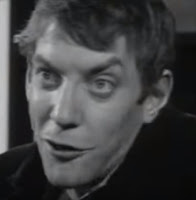More about the JCPCP on the Egalitarian Publishing site. I've slightly lost the thread of which issue which column has appeared in, but this one has certainly been published. In fact, I don't remember writing parts of it.
Sighcology
The progress of the working-class grammar school boy and the estrangement from his background it brought about were once such a theme of English letters that it was honoured with a Monty Python sketch inverting it.
A coal miner returns home to his playwright father and receives a cold welcome:
“Hampstead wasn't good enough for you, was it? You had to go poncing off to Barnsley, you and your coal-mining friends.”
The grandfather of this school of writing was D.H. Lawrence, and I was studying his novel The Rainbow for A level when David Storey’s Saville won the Booker Prize. Our teacher talked of Storey’s debt to Lawrence and suggested we considered reading his novel.
Saville introduced me to David Storey, whose early life encompassed elements no novelist would dare combine. At one time, Storey’s posthumous memoir A Stinging Life reminds us, he was studying fine art at the Slade in the week and supporting himself by taking the train north at the weekend to play rugby league for Leeds.
Fashions change, and a few years ago I saw Andy Miller from the Backlisted podcast exclaiming online that Saville had won the Booker Prize yet he could find no one who had read it.
******
Writing for the online publication Too Little / Too Hard, Rachael Allen recalls being the first in her family to receive any kind of schooling after the age of 14:
At Goldsmiths, I did not meet the children of cleaners or shop workers. I met the children of landlords, the children of airline pilots, and actual princesses, the children of executives at mega pharmaceutical companies, people so wealthy they owned their own charities. I met the children of TV personalities and doctors, barons and writers.
And she goes on to record a revelation that many of us have experienced:
One of my most eye-opening experiences as a working-class person moving into educated and middle-class spaces was the correction to my misconception that wealthy people are clever. I held onto this misconception for longer than I should have, because, at university, and then into my professional life, I was surrounded by the rich.
The English are indeed likely to confuse an upper-class accent with intelligence – a failing that more than one contemporary comedian has exploited to land a more serious column. But Allen says her working-class father reads more than anyone she knows, giving himself a summer to read War and Peace and then everything around Tolstoy and Russian literature he can find. She grew up with him pointing out flowers, leaves, and trees in the Latin that he had taught himself over the years as an amateur naturalist.
My own class background is complicated – my mother once claimed to have “gone from rags to rags in one generation” – but when I was a poor teenager, I was still able to pass as middle class. The disadvantage of this was that, in an instance of the same fallacy, it did not occur to any teacher that I might be having problems.
******
Class, which once held a central place in our political discourse, now competes with other sources of injustice. The Conservative MP David Johnston once wrote about his time running social mobility. recalling a firm which, while it thought itself fully signed up to the concept, nevertheless raised queries like:
“Our clients need us to have worldliness and you get that by travelling the world. So how will the young people you work with be able to demonstrate it?"
and
“They’ll be alongside the children of high net-worth individuals who we’re teaching how to invest the assets their parents gave them, so you’ll have to send us someone suitable.”
Johnston would watch banks professional service firms fall over each other to hire black graduates if they were privately educated and from professional families:
These young people were deemed to have the requisite social capital they claimed their “clients expect from us”. If, however, you were the sort of black young person my organisations typically helped – poor and from a council estate – enthusiasm waned.
All these companies, said Johnston, would talk on their websites about valuing diversity, but diversity of social background was not tend to be high on their agenda. You could be black or white, but you had to be middle class.
Without the right social connections you will never break into the circles where the best jobs are on offer. Andy Burnham was mocked when he spoke of the problems in this he had still faced with a Cambridge degree – hadn’t been in the cabinet before he was 40? – but then he had found an alternative network in the shape of the Labour Party.
******
I saw a tweet from another female academic, Professor Amanda Vickery, the other day:
Found Saltburn unpleasant. Brought back memories of being working class at uni. Am decades from that & obvs privileged now, but still recall that any time I said "no my father was a bricklayer & no we never went skiing", boys would launch into the Monty Python sketch.
There’s little doubt which sketch that was, though the Four Yorkshiremen were originally seen in an earlier television programme, At Last the 1948 Show, and the sketch was written and performed by Marty Feldman, Graeme Garden and Tim Brooke-Taylor, as well as John Cleese. You know, I think we’ve found a hill I will die on.
A radical reading of the Four Yorkshiremen is possible – we are laughing at the self-aggrandisement of the rich as they tell increasingly incredible stories of their own childhoods – but Vickery’s fellow students found the very idea of poverty amusing and old fashioned. It’s become just one more of those odd notions that private school pupils tease one another out of holding so they can be sure of fitting in.
Which may be why, if British novelists wrote of nothing but the experiences of the bright poor boy in the Fifties and early Sixties, they now seldom mention the working class at all.




























